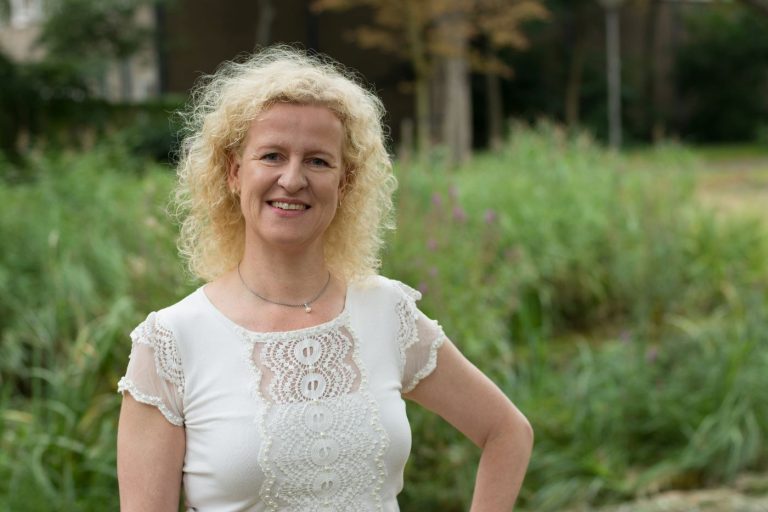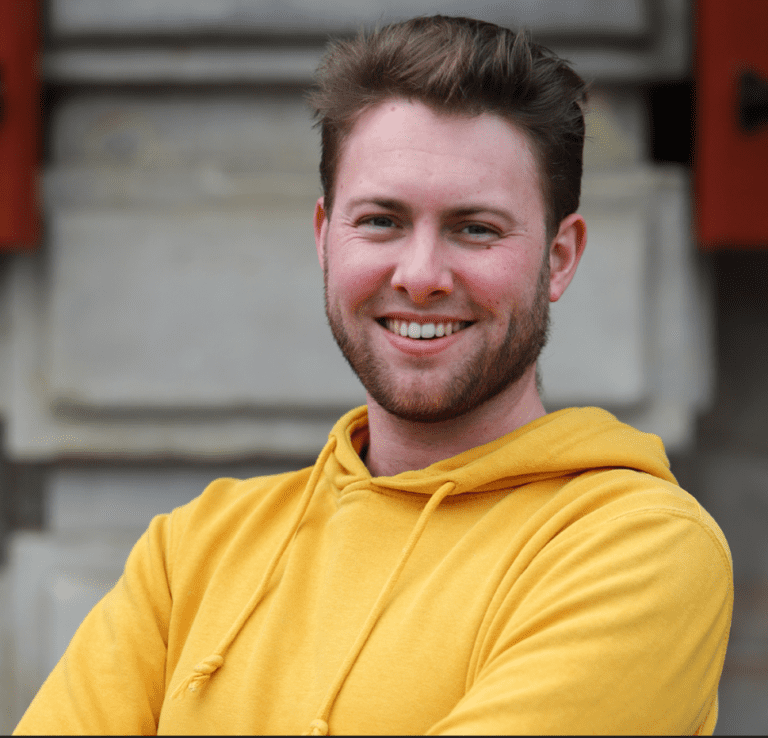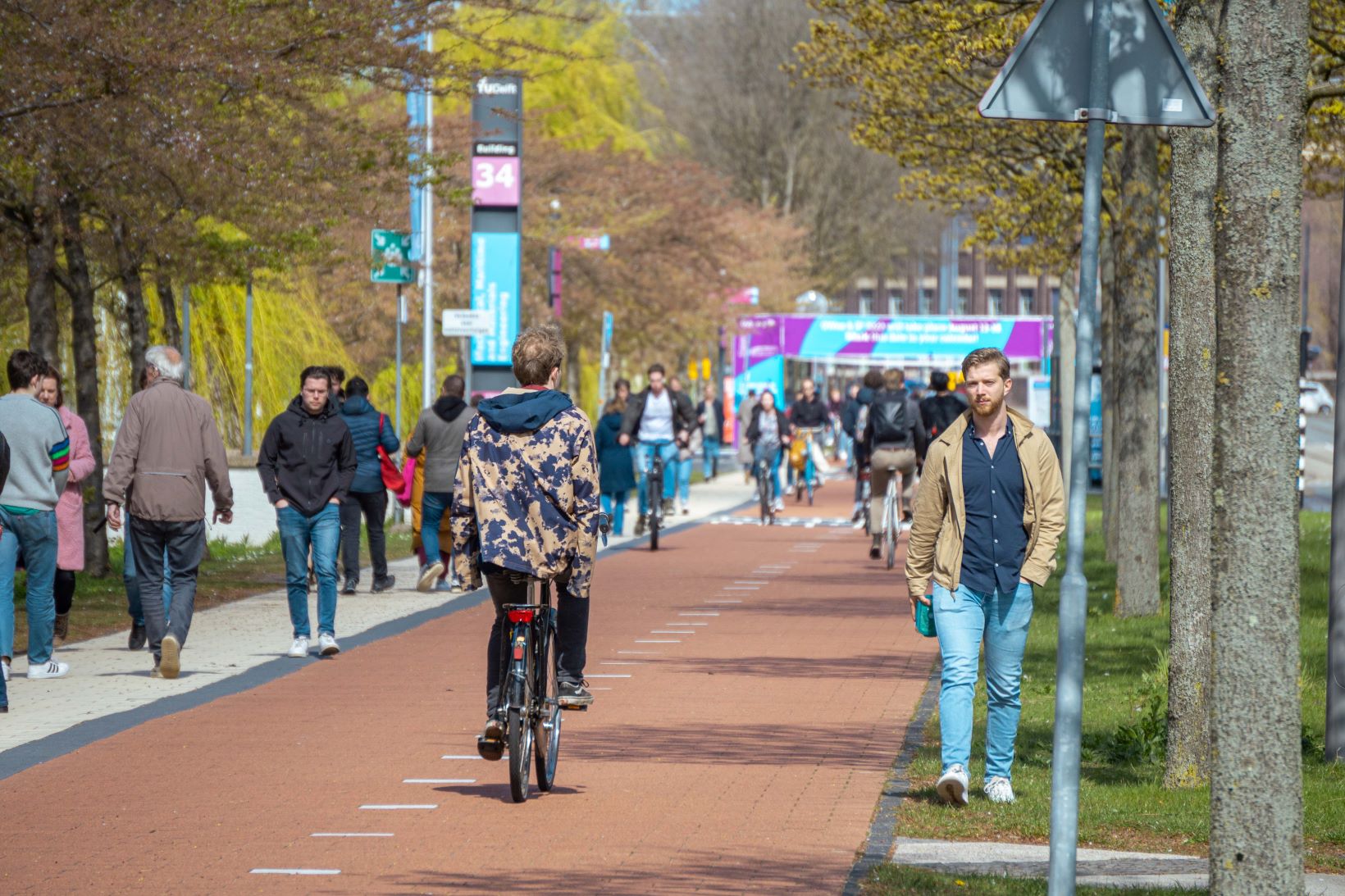Studium Generale and Delta will hold a theater dialogue on Tuesday, May 9, about TU’s growth plans. Delta asked three panelists about their positions in advance.
Studium Generale en Delta organiseren een theaterdialoog over de groeiplannen van het college van bestuur (Foto: Thijs van Reeuwijk)
For the event ‘The Colossal Campus’ on May 9, Delta and Studium Generale invited several experts. Delta spoke with student Marten Leenders, local resident Julian Gommers and teacher Claudia Werker. All spoke in a personal capacity. Professor Remco Breuker is also a member of the panel. He gives his views in this interview.
Student Marten Leenders: TU Delft should keep an eye on student well-being
“I see the growth plans as a blank page. There are all sorts of opportunities and we students can help fill in the blanks. These could include new interdisciplinary degree programmes or new potential forms of cooperation such as with the Port of Rotterdam. It took some pushing from the Student Council, but students are now involved in the discussions in the capacity of a full member. And rightly so. After all, there are 28,000 students compared to 6,000 staff members. This gives us an important voice in shaping the future plans that TU Delft should not forget.
Apart from the opportunities, I also see risks in the areas of student well-being, the quality of education, student accommodation, and the TU Delft identity. The plans must not come at the cost of personal contact between students and teachers. More students could mean fewer teachers per student and thus less personal education. TU Delft needs to do its best in recruiting enough staff. Furthermore, we already have a welfare issue. Students are suffering psychologically while the waiting list for support is long. More students means that more student psychologists are needed to avoid student well-being from plummeting. Personal education is closely related to this. Housing remains a problem. The shortage of rooms is already huge so what does this mean for further growth? TU Delft needs to keep an eye on this and take precautions where needed.”

Teacher and researcher Claudia Werker: ‘Also think about a scenario of shrinking’
“We have plenty of personal experiences from staff members in-house for the multi-campus strategy of campuses in Rotterdam and The Hague. Teachers in the Engineering & Policy Analysis (EPA) master’s degree programme in The Hague or the dual master’s connected to the Leiden-Delft-Erasmus centres (LDE) already divide their time across different places. Some of them miss a home-base and come up against practical problems as they are continuously on the road. Not only does this take a lot of time, but also brings about practical problems such as when to meet colleagues. The Executive Board needs to take these experiences and issues into account.
Most importantly, the future strategy needs to rest on strong foundations. This means thoroughly examining whether the intended growth will really happen and to think about scenarios should student numbers drop instead. The foundations are not strong at the moment. Look at labour market prognoses such as that carried out by the Research Centre for Education and the Labour Market at the University of Maastricht. It does not look beyond 2026 as technological developments are not easily predicted in the long term. This means that you do not know how many engineers will be needed in the long term, while the plan for more campuses is certainly intended for a period of at least 20 to 30 years. To give one example, what if ChatGPT takes over programming and we do not need as many Computer Science students? It is thus useful to think about scenarios of shrinking numbers. Make it a rule that rental contracts only run up to a period of 10 years at the most. And adapt the personnel policy in terms of age structure so that in case of shrinkage, the staff body can be reduced through natural processes instead of staff redundancies.”

Delft resident Julian Gommers: ‘TU Delft needs to do more about raising awareness among students’
“Will the balance between the city and TU Delft be retained? TU Delft needs to think about this continuously given its plans to grow. In my eyes, the balance is fine at the moment, but there are neighbourhood residents who think differently. There is occasional tension. Students and people in Delft live in the same neighbourhoods and often in buildings that are not suitable for communal living. These include poorly insulated terraced houses that are divided into several student rooms or homes. This causes noise problems. Instead of crying babies, the people in Delft now have students that sometimes have friends over till deep in the night. This is a pity as it means that the people in Delft and students stand on opposite sides instead of all of us living in the city and getting on with life. TU Delft needs to do more about good student housing.
I don’t think that the growth in itself is the main problem, nor that the current problems will be solved by sending all the students away or making them all live in one place. TU Delft needs to do more about providing information to students. Those living in the city centre see that the students do not always have the social sensitivity to realise that it is not right to make a lot of noise in the middle of the night in a residential neighbourhood. The international students that come here undergo a short programme at TU Delft in which they learn about the basics of Dutch society. Something along these lines could be done for all students, and then with the focus on living with others in Delft. In other words, TU Delft needs to make first, second and third years aware of the fact that other people live in Delft too and that they have a different routine than students.”
- Marten Leenders studies Mechanical Engineering and is the Chair of the Central Student Council. He was part of an advisory group about TU Delft’s growth plans.
- Claudia Werker is an Associate Professor in Economics of Technology and Innovation at the Faculty of Technology, Policy and Management (TPM). She is an expert in the area of innovative ecosystems and mostly examines the role of academics at technical universities in those systems. She has worked at TU Delft since 2007. She is Vice Chair of the Works Council.
- Julian Gommers is a neighbourhood resident in Delft and was previously involved in a neighbourhood association. He graduated from The Hague University of Applied Sciences a couple of years ago and experiences what it is like to live in a city where a university has such a strong presence.
Do you have a question or comment about this article?
a.m.debruijn@tudelft.nl


Comments are closed.